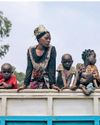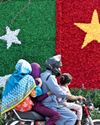
In mid-June, Giorgia Meloni was in an exultant mood while hosting the G7 summit, a gathering of the world's most powerful nations, in the southern Italian region of Apulia.
After days in which she presided over meetings speaking English, French and Spanish along with her native Italian, one evening she danced the pizzica - a traditional Apulian dance - twirling and hopping to the trance-like rhythmic folk music often played at local weddings at a contagious 100 beats per minute.
Meloni's uninhibited performance expressed the self-confidence of an emerging political star, who, after a strong showing in the European elections just a few days earlier, was the hottest political leader in Europe. She took a selfie with Indian strongman Narendra Modi, which she posted on Instagram to her 3.5 million followers with the caption: "Hello from the MELODI team." For a politician who only a few years ago was stuck at the margins of Italian politics as the head of a small rightwing party, Brothers of Italy, Meloni, at 47, appeared to be on top of the world.
Meloni has worked hard to achieve the respectability that has eluded other rightwing parties such as Marine Le Pen's National Rally. She was received at the White House by Joe Biden and has been accepted by centrist parties within the EU. This is all the more surprising given the openly neo-fascist origins of her career. (Just before she was elected prime minister in late 2022, author Roberto Saviano wrote in the Guardian: "Giorgia Meloni is a danger to Italy and the rest of Europe.") But in two years, she has surprised many people by her political pragmatism and shrewd ability.
This story is from the October 04, 2024 edition of The Guardian Weekly.
Start your 7-day Magzter GOLD free trial to access thousands of curated premium stories, and 9,000+ magazines and newspapers.
Already a subscriber ? Sign In
This story is from the October 04, 2024 edition of The Guardian Weekly.
Start your 7-day Magzter GOLD free trial to access thousands of curated premium stories, and 9,000+ magazines and newspapers.
Already a subscriber? Sign In

Trump lives in a fantasy political world but reality will prevail
Why exactly is Donald Trump's new presidency so disorienting? So far, explanations have tended to focus on its manic pace, contempt for political conventions and blatant subversion of supposedly one of the world's most robust democracies.

'I curse this war': hunger and fear after rebel takeover
People living in Goma on the Democratic Republic of the Congo's eastern border with Rwanda have spoken of their fear and acute hunger after the M23 rebel group swept into the city last week.

The life aquatic
Adventurers have long wondered if we could live on the seabed. Now, 80 metres below the surface of a flooded quarry in the UK, we are about to find out

The secret to startup's rapid AI success
Who is behind DeepSeek and how did it achieve such an impressive feat in such a short time?
My inside story
Louise Lancaster was one of a group of Just Stop Oil activists given the longest-ever UK sentences for peaceful protest after blocking a motorway. Six months into her incarceration, the mother of three adult children reveals what she has learned about life in prison

What went wrong with the China-funded Dubai 2.0?
The city of Gwadar has a huge new airport, but suspicion of Beijing's true intentions threatens to wreck the project

Into the deep
The emergence of DeepSeek-a Chinese AI chatbot supposedly developed at a fraction of the cost of Silicon Valley models has stunned the US tech giants and potentially opened up the artificial intelligence race to a host of other players

Labour is sacrificing all to the god of GDP-and mocking objections
I can scarcely believe I'm writing this, but it's hard to dodge the conclusion. After 14 years of environmental vandalism, it might seem impossible for Labour to offer anything but improvement. But on green issues, this government is worse than the Tories.

Keeping up with Bridget Jones
Nearly 25 years after the first of the films about the ultimate singleton, Renée Zellweger discusses the resting place for her character's massive knickers

Fright club: why chills are hot
The paranormal has hit prime time, with scary podcasts and TV shows more popular than ever. Why does the unexplained have sucha holdonus?
